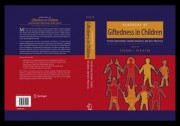 Though not often recognized as “special needs” students, gifted children require just as much attention and educational resources to thrive in school as do other students whose physical, behavioral, emotional or learning needs require special accommodations. So says a Florida State University professor who has studied gifted students for years.
Though not often recognized as “special needs” students, gifted children require just as much attention and educational resources to thrive in school as do other students whose physical, behavioral, emotional or learning needs require special accommodations. So says a Florida State University professor who has studied gifted students for years.
Steven I. Pfeiffer is a professor in Florida State’s Department of Educational Psychology and Learning Systems. He also is a licensed psychologist who works with gifted children and their families in counseling, and has long been recognized as one of the nation’s leading authorities on issues related to gifted children.
“There is a view occasionally expressed by those outside of the gifted field that we don’t need programs devoted specifically to gifted students,” Pfeiffer said. “‘Oh, they’re smart, they’ll do fine on their own’ is what we often hear. And because of this anti-elitist attitude, it’s often difficult to get funding for programs and services that help us to develop some of our brightest, most advanced kids — America’s most valuable resource.
“Giftedness is still not well understood, and children with advanced intellectual and academic abilities can perplex and challenge both educators and parents,” Pfeiffer said.
A key problem in working with gifted children is one of definition. What exactly does it mean to be “gifted”?
“Even within the gifted field, there is considerable controversy regarding definitional, conceptual and diagnostic issues,” Pfeiffer said. “However, as a generally agreed-upon definition, gifted children are those who are in the upper 3 percent to 5 percent compared to their peers in one or more of the following domains: general intellectual ability, specific academic competence, the visual or performing arts, leadership and creativity.”
A key area of Pfeiffer’s research has been finding ways to best identify children who are gifted. To that end, he led a group that developed a diagnostic test which complements the widely used intelligence test in identifying children who might be gifted. Pfeiffer’s test is now being used in more than 600 school districts across the nation and has been translated for use in a number of other countries. (For more information on the Gifted Rating Scales, visit www.fsu.com/pages/2006/11/20/gifted_rating_scales.html.)
“For almost a hundred years, schools used one measure, the IQ test,” Pfeiffer said. “Our own research indicates that the IQ test, although it works fairly well, is not without limitations in identifying giftedness. We launched a project to develop a test that would be a companion to the IQ test in helping educators better identify those children who have potential but perhaps are missed on IQ tests.”
Pfeiffer discusses the issue of defining giftedness and many of the emotional and social challenges facing gifted children in a new paper, “The Gifted: Clinical Challenges and Practice Opportunities for Child Psychiatry,” that will soon be published in the peer-reviewed Journal of the American Academy of Child & Adolescent Psychiatry.
In other work involving gifted students, the state of Florida recently asked Pfeiffer and his team to lead an effort to help Florida’s best and brightest high school students reach their potential so they can help the state reach its. The result was the establishment of the Florida Governor’s School for Space Science and Technology, which was created by the Legislature in 2007. (Visit www.fsu.com/pages/2008/04/08/space_science_and_tech.html to read more.)
“The Florida State University — in partnership with the Florida Institute of Technology and Embry-Riddle Aeronautical University — was fortunate to be asked to develop a plan to design a state-of-the-art residential academy for Florida’s most capable high school students,” Pfeiffer said. “Essentially, the Florida Legislature was interested in providing resources for Florida’s brightest students in high schools, particularly in terms of a curriculum which would emphasize science, math, engineering and technology.”
Pfeiffer also edited a recently published book, “Handbook of Giftedness in Children: Psycho-Educational Theory, Research, and Best Practices,” that brings together experts from the fields of psychology and education to discuss a wide variety of topics pertaining to giftedness. He says the book is intended to be an essential resource for anyone working with gifted and talented children, including clinical child and school psychologists, educators, child psychiatrists, family therapists, social workers, pediatricians and other health care professionals.
And finally, Pfeiffer is working with the national organization SENG (Supporting Emotional Needs of the Gifted) to develop a certification system so that professionals working with gifted children — educators, mental health providers, pediatricians and others — will be able to receive an official designation citing their expertise in this area.
Source:Florida State University
